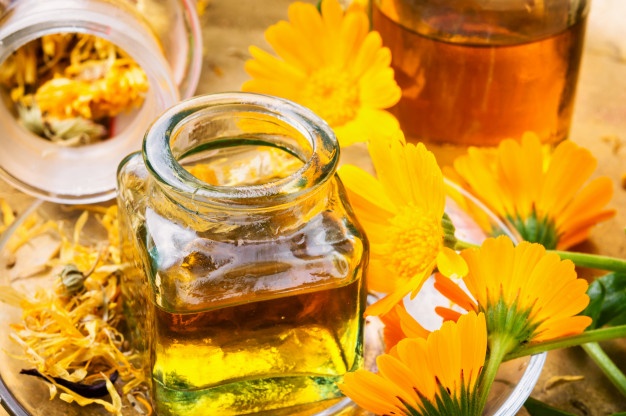HOW TO MAKE YOUR OWN MACERATE?
You can buy several basic macerates in our shop:
- calendula in sunflower oil
- calendula in sunflower oil
However, there are plenty of herbs or plants that you can make your own macerate from. You may have them at home or in your garden and have no idea how to enjoy their healing or nourishing properties for as long as possible.
What is this macerate anyway?
Macerate or macerated oil is basically a carrier oil that serves as a "solvent" to extract the medicinal properties of a given plant or fruit. The most common oils used for maceration are almond, sunflower, olive, coconut, or jojoba oil.
Many herbs are suitable for infusion. For example, you can try jasmine, lavender, calendula, carrot, sea buckthorn, St. John's wort, rosemary, oregano, spearmint, vanilla, or comfrey
Should I use fresh or dried plants for maceration?
Dried are ideal because they do not contain water and, in addition to making the maceration process easier for you, they will give you the longest shelf life of the oil. Fresh plants contain water and need to be changed more often and the final product monitored more frequently so that youthis also depends on the type of oil, as some oils are prone to drying out more quickly. In this case, it is recommended to add 0.5-1.0% vitamin E (tocopherol), which is a powerful antioxidant
But let's get down to the actual preparation of the macerate
The most common way is to macerate in oil for about 3 - 6 weeks (After 3 weeks the macerate should be ready and of good quality. You can extend the maceration time. 6 weeks is considered the maximum time). You need a clean glass jar to which you add the herbs (ideally finely chopped and topped up) and pour the oil. Seal the jar and shake, stir and stir the herbs several times to make sure they arefully covered and air bubbles are removed (bubbles promote oxidation of the oil and shorten its shelf life considerably). Once the container is sealed, place it in a warm place - ideally on a windowsill, where the sun's rays will gently heat it up - this is the ideal temperature for infusion. Shake the jar over a few days to ensure better extraction. In the case of black plants or fruits, the macerated material needs to be changed approximately every week
Storage of the macerate
After three to six weeks, strain the macerate - you can pass it through a sieve, but it is ideal to strain it through a cloth - and store it as best you can.preferably in smaller sterile containers to avoid excessive contact with air when reusing and opening the container. The resulting macerated oil may take on a new colour depending on the plant being macerated. It will last you approximately 6-12 months as long as you store it in a dark cooler place out of direct sunlight
Should you smell a significant change in scent or cloudiness, the macerate is no longer safe to use.


Heat preparation of the macerate
For the impatient, here is another quick way to make macerate. Prepare an equal mass of macerated ingredients in a water bath and heat it up. It is quite essential that you keep the temperature on the lowest setting for 2-6 hours and do not boil the oil. Here, however, you need to control the temperature very carefully. In domestic conditions, you can easily find that the temperature rises and the oil and the herbs spoil
Use in cosmetics
Macerates have a wide range of applications in cosmetic products, from skin care products, to balms, salves, creams, soaps and hair products.
They are used in a 5-10% ratio. If the macerate replaces the carrier oil in the product, you can use it in a higher proportion.
They are used in a 5-10% ratio. If the macerate replaces the carrier oil in the product, you can use it in a higher proportion.
In addition to their medicinal properties, macerates can also serve as natural fragrances, such as vanilla macerated in jojoba oil will give your products a wonderful natural vanilla aroma. Monoi de tahiti is also an excellent aromatic ingredient for products.
Finally, we would like to point out that although your macerate may be a hit, you need to test it on your skin before using it. Although all macerate ingredients are natural, some of you may be allergic to certain plants.
Do you make your own macerates at home or have we just inspired you? Share with us at marketing@handymade.sk.
Article prepared for you by
Martina Oboňová

Sources:
https://formulabotanica.com/how-to-make-macerated-oils/
Do you make your own macerates at home or have we just inspired you? Share with us at marketing@handymade.sk.
Article prepared for you by
Martina Oboňová

Sources:
https://formulabotanica.com/how-to-make-macerated-oils/


